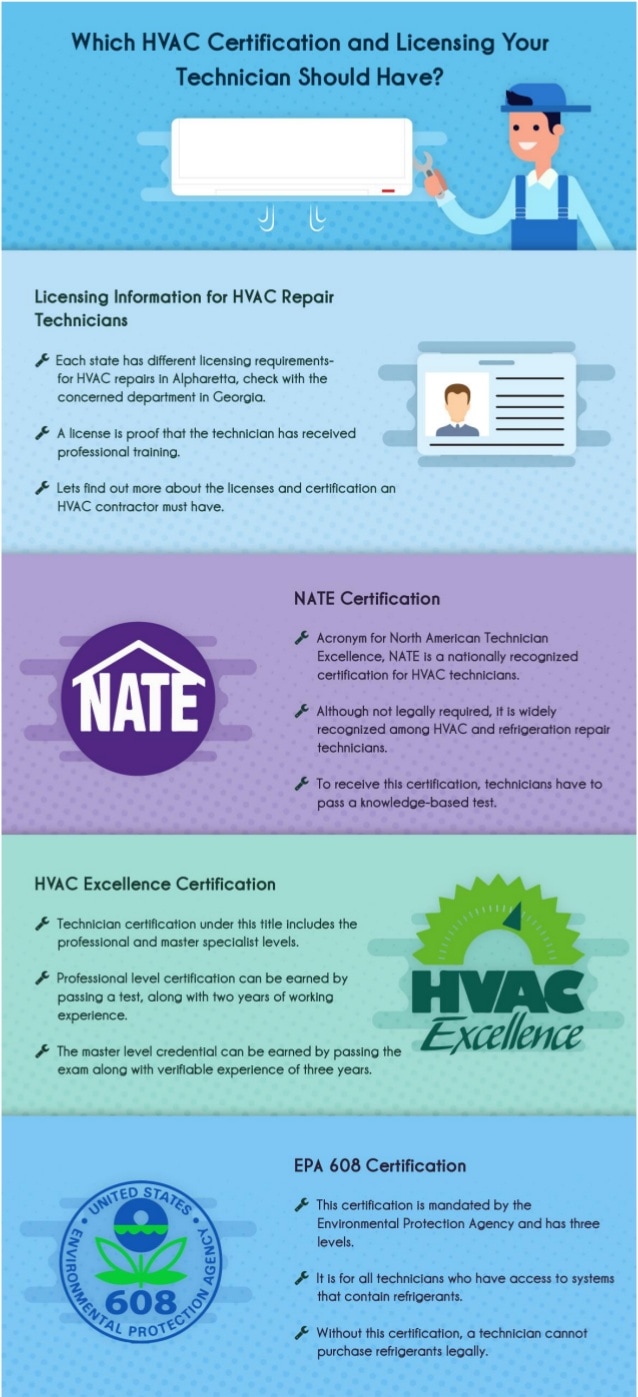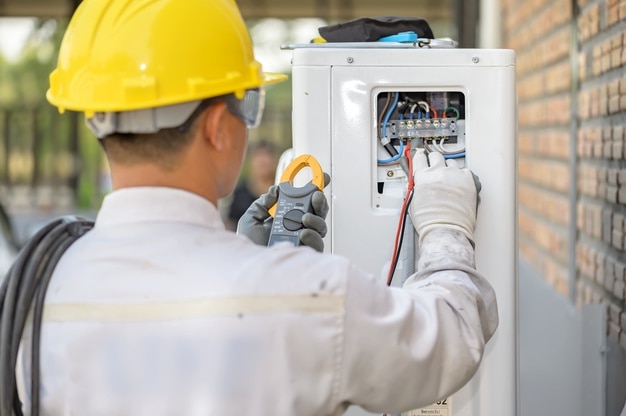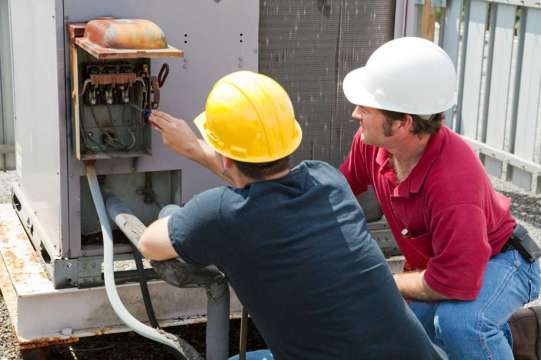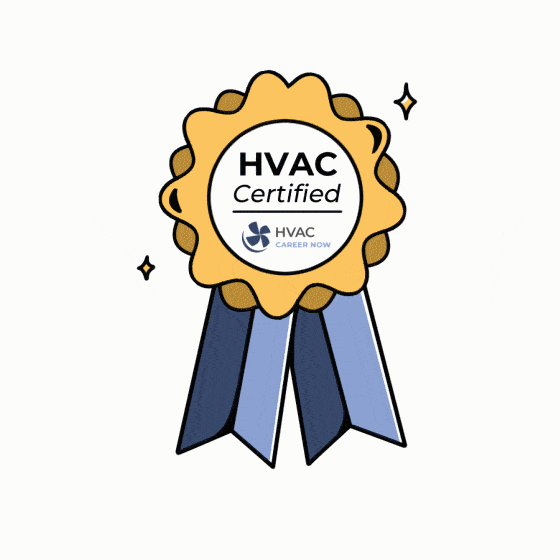HVAC stands for heating, ventilation, and air conditioning, but is sometimes referred to as HVAC/R to include the refrigeration aspect.
Although it isn’t mandatory in all states to have an HVAC certification, there are some excellent reasons to pursue it.
Let’s take a closer look at what it is and how to obtain it.

What is HVAC Certification?
An HVAC certification proves that you can carry out relevant technician work competently and safely. In turn, it can lead to more work, larger-scale assignments, and higher earnings.
To be HVAC certified, you need the following:
Certificates
To attain certification, you need to pass a knowledge-based examination to confirm your general understanding of the HVAC industry.
In some states, you must have specific certification for different activities within the HVAC industry. For example, in some states, working in HVAC, running your own firm, or being considered an HVAC professional each has their own certifications.
Safety Certifications
HVAC courses cover general safety, including the handling of equipment and refrigerants.
However, there’s a federal certification required for technicians who deal with specific types of HVAC equipment.
We’ll look at this in more detail in the next section, which discusses additional certification.
Additional Certification

Beyond the entry-level HVAC certification, there are additional credentials that may be mandatory in your state or optional as a commercial decision. Some of those are described here.
EPA Certification
Technicians who work on any kind of equipment that could release refrigerants into the atmosphere are obliged to obtain the appropriate EPA certification.
This is mandated by Section 608 of the Clean Air Act and includes any technician involved in the maintenance, repair, and servicing of this kind of equipment, including disposing of it.
There are categories for three different product types—small, high-pressure, and low-pressure. There’s also a universal certification that relates to all three categories.
HVAC engineers who wish to work in industrial or commercial settings can also obtain LEED (Leadership in Energy and Environmental Design) certification. LEED is an initiative from the US Green Building Council promoting sustainable, eco-friendly construction practices.
Exams
Exams are usually a combination of written and practical tests. You must take an accredited HVAC course at a reputable trade school for your certification to be widely recognized.
The primary issuing bodies for HVAC certificates are the EPA (Environmental Protection Agency), NATE (North American Technical Excellence), and HVAC Excellence.
For any of them, before you can take the exam, you must pass an accredited course and obtain an HVAC technician certification.
Career Path to Becoming a Certified HVAC Technician
Like most other industries, there’s a path towards a professional qualification for HVAC technicians. If you choose to specialize within the industry, you often need to obtain additional certification or licensing for that particular sector.
High School Diploma or GED
This is your starting point. You need to earn a high school diploma or pass the GED to begin your HVAC certification journey.
Certification
You need to take an accredited HVAC course and pass the final exam. You can take the course at a technical school, community college, or online.
This is your entry-level qualification; the course normally lasts between six and 12 months.

Associate’s Degree
For a broader understanding of the HVAC industry, complete the required coursework to earn an associate’s degree. It’s a two-year program that you can take in college.
Online Courses
Online courses provide a more flexible learning regime because you’re not committed to fixed classroom schedules. Ensure that the course you choose is accredited to ensure that the qualification will be officially recognized.
Apprenticeship
Apprenticeships usually last three to five years and require around 200 total hours of classroom instruction in addition to the time you spend in the field.
Different Types of HVAC Certifications and Associated Costs
Even without considering state-specific requirements, the route to HVAC certification isn’t a straight one. However, the starting point is to have a high-school diploma or GED equivalent.
Let’s learn about various HVAC requirements and the associated costs of fulfilling them.
Apprenticeships
In addition to your work in the field alongside a certified technician, you’ll need to either attend classes two or three evenings per week or self-study.

An apprenticeship usually costs between $500 and $2,000. Some employers or trade associations will pay the costs of an apprenticeship. Sometimes, it’s possible to earn wages while you complete it.
An apprenticeship is an excellent option if you’re well-organized because it can provide more flexibility regarding when you do your academic studies.
On the other hand, if you respond better to a more rigid structure, then the more formal educational route may be a better choice.
Accredited HVAC Certification Courses
It’s essential to ensure that you enroll in an accredited HVAC course, so trade organizations and state authorities recognize the qualifications you attain.
Technical and community colleges often run accredited HVAC courses, which typically take between six and 12 months to complete. The cost of taking these courses ranges from $1,200 to $15,000.
Certification gained via the educational route is generally attributed to more prestige because it has an educational establishment behind it.
Depending upon which state you work in, you may be required to renew your certification every few years. This normally means attending a few hours of classes to ensure your knowledge keeps up with the evolution of HVAC equipment, techniques, and standards.
EPA Certification
The EPA certification is a compulsory federal certification that you must hold if your work falls within one or more of the categories detailed below:
|
EPA Certification |
Applicable to |
|---|---|
|
Type I |
Technicians who service small HVAC appliances. |
|
Type II |
Technicians who service or dispose of high- or very high-pressure appliances. This excludes small appliances. |
|
Type III |
Technicians who service or dispose of low-pressure appliances. |
|
Type IV |
Covers the other three categories. With this, you can work with any kind of HVAC equipment in any state across the country. |
The EPA has designated three categories relating to the kind of work done and the type of equipment that’s required.
Taking the exams for EPA certification costs anywhere between $40 to $240, but no renewal is required.
Leadership in Energy and Environmental Design (LEED)
Green Building Education Services (GBES) created the LEED certifications to answer the ever-growing demand for sustainable, energy-efficient buildings and the increasing demand to deliver and maintain those standards.
LEED certification allows you the opportunity to work on larger-scale commercial and residential construction projects in the planning phase and post-construction.
Out of the five LEED certification categories, the two directly related to HVAC are LEED BD+C for New Construction and Major Renovations and LEED ID+C for Commercial Interiors.
The LEED GA course can be completed in a self-study format and costs up to $250.
Training resources, including practice exams, cost from $80 to $300.
The exam for GA alone costs $250 for non-members while the combined exam is $500.
NATE Certification

North American Technician Excellence (NATE) is one of the leading issuers of HVAC certification. Its certifications are practical ones, emphasizing your knowledge; they’re also nationally recognized.
NATE has three types of certification:
- Ready to Work: New entrants to the professional world of HVAC
- HVAC Support Technician: Technicians with six to 12 months or more experience
- Professional certificates in specialized areas, including commercial refrigeration, heat pumps, and oil heating
NATE sells the learning and exam preparation materials, but the exams are administered by private companies, with prices starting at $50.
The certification needs to be renewed every two years, which can be done by either submitting 16 continuing education hours (CEH) or retaking the exam.
How Much Can You Earn as an HVAC Technician?
An HVAC technician who can demonstrate that they have the knowledge and skills to perform their profession in a high-quality manner will always stand out from the rest.
New HVAC technicians can earn an average of around $43,000 per year. With five to seven years of experience, this can increase to an average of around $50,000.
In general, certified HVAC technicians receive more work, and are paid extra, so your early outlay on courses, materials, and exams is a fantastic investment.
Certification in specialized areas can increase your earnings further. For example, putting in the extra work and money to attain EPA IV certification broadens your knowledge and proven competency.
Similarly, attaining the LEED certification makes you a more attractive proposition for work on large building or renovation projects.
Your location will influence your earnings. In a 2021 survey by Housecall Pro, the lowest average hourly rate for an HVAC technician in the U.S.A is $18.23 in Arkansas. By contrast, Alaska’s average is $39.48, which is the highest average in the country.
As technology evolves, the only way to keep ahead of your competitors is to attain certification and renew it as often as needed.

Conclusion
Continued certification is the driver of a lucrative HVAC career, including the ability to get your contractor’s license and start your own firm.
With additional accreditation under the LEED initiative and specialist certification from the EPA and NATE, you can keep ahead of your competitors and access developing markets where your skills are in greater demand.
As we’ve seen, your outlay on education and certification is small compared to your earning potential in this fast-moving industry.
People Also Ask
In this article, we’ve shown the best way to start and pursue a career in HVAC. If you’re still not sure whether or not this is the career path for you, we’ve addressed some of the most frequently asked questions to help you decide.
Yes, it’s worth it. If you invest in yourself, you can have a career that combines continuous learning and the practical application of that knowledge.
People always want to control their environment. You can service that need with your specialized knowledge in the field.
You can obtain the initial certification by completing a six-to-12-month course and passing the accredited exam.
If you’re ambitious, then the certification doesn’t stop. This is because there are always new specialisms you can pursue that will broaden your commercial appeal.
Requirements to operate as an HVAC technician vary depending on the state, with some requiring more licensing or insurance than others. As a result, additional costs are created.
Even if the prices are similar between states, sales tax rates vary based on the state you’re operating in.
